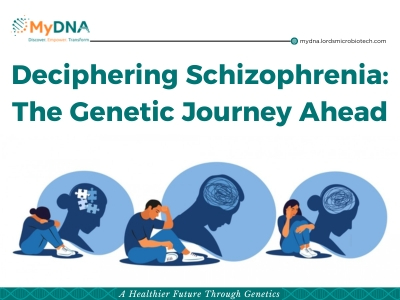
Schizophrenia Schizophrenia is a brain disorder classified as a psychosis which is characterised with symptoms like false perceptions called hallucinations, decreased ability to function, Inappropriate emotional reactions, erratic speech and behavior, trouble with daily activities and personal cleanliness, disordered thinking and concentration. Genetics of schizophrenia is multifaceted, affecting 24 million individual worldwide with each genetic variation and epigenetic alteration contributing to the disorder.
Genetics (vs environmental) factors plays a predominant role in the development of schizophrenia, with heritability estimates ranging from 60% to 80%. However this condition does not follow specific dominant or recessive pattern of inheritance.
Candidate Genes
Several candidate genes have emerged as key players in schizophrenia susceptibility. Among these, the dopamine-related genes, such as DRD2 and COMT, has been given considerable attention due to their involvement in neurotransmission and dopaminergic dysfunction, a hallmark feature of schizophrenia.
Additionally, genes involved in synaptic plasticity (e.g., DISC1, NRXN1) and glutamatergic neurotransmission (e.g., GRIN2A, GRM3) have been implicated, underscoring the complexity of neuronal signaling disruptions in schizophrenia pathogenesis.
Polygenic Risk Ratings: Linking the Pieces
Recent developments in polygenic risk score (PRS) analysis have made it possible to gain a more thorough understanding of the genetics of schizophrenia. Through the combination of genetic variants across the genome, PRS offers insights into the susceptibility of each individual to schizophrenia. Additionally, PRS makes it easier to identify genetic risk that is common to psychiatric diseases, revealing biological pathways that overlap and possible targets for treatment.
Pathways and Networks: Researchers are pinpointing specific gene networks involved in brain development and function that seem to be disrupted in schizophrenia. These networks are often related to:
- Glutamate and GABA signaling: Neurotransmitters crucial for communication between brain cells.
- Synaptic function: How brain cells connect and transmit information.
- Neurodevelopment: Processes shaping the brain's structure.
Environmental Triggers: Genes alone don't dictate who develops schizophrenia. Environmental factors like childhood trauma, substance abuse, and social isolation can interact with genetic predispositions, potentially triggering the onset of the illness.
Future Direction :
Risk Prediction: It helps to understanding an individual's genetic makeup could potentially provide an estimate of their susceptibility to schizophrenia.
As we unravel the genetic intricacies of schizophrenia, personalized approaches to diagnosis and treatment are on the horizon. Integrating genetic data with clinical parameters and neuroimaging techniques holds promise for delineating distinct subtypes of schizophrenia and guiding tailored therapeutic interventions.\
In summary, we are now a inch closer to understanding individuals genetic code for schizophrenia. While much remains to be elucidated, ongoing research endeavors by technological advancements offer unprecedented opportunities to the molecular understanding of schizophrenia and has shaped the way for innovative treatment strategies, where interventions are tailored to the individual's genetic makeup and underlying neurobiology, ultimately offering hope for improved outcomes and quality of life for individuals with this complex condition.